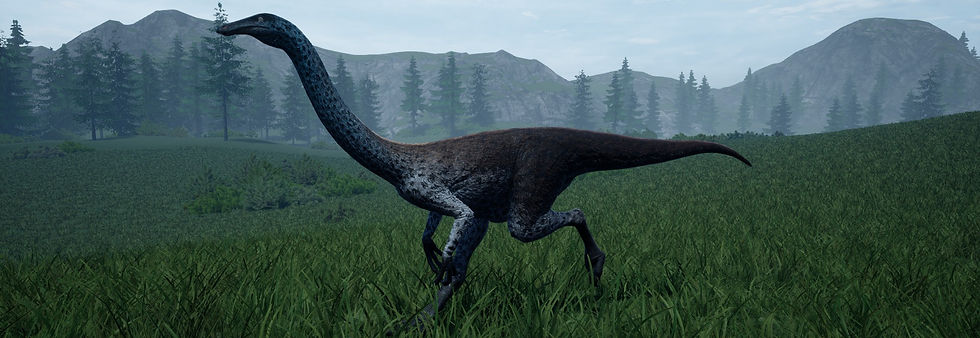
GALLIMIMUS
With a name meaning "chicken mimic", Gallimimus bullatus (gal-ee-my-muss bull-a-tuss) is the most famous member of ornithomimosauria or "ostrich dinosaurs".
Original Discovery

Gallimimus was first discovered in Mongolia in 1963 by a team of fossil hunters under the command of Polish paleobiologist Zofia Kielan-Jaworowska. Nine years later, the one and only species was named and described by Polish paleontologists Rinchen Barsbold, Halszka Osmólska, and Ewa Roniewicz.
Physical Appearance

It is likely that Gallimimus would have looked very similar to modern ostriches and emus, with long legs and long necks ending in toothless beaks. It is also believed that Gallimimus possessed feathers throughout its life, even growing large feathers on its arms when it reached adulthood. While these feathers were identical to early flight feathers, adult Gallimimus were to large for flight. These feathers were likely for display purposes, although it is possible that they could have helped the animal turn faster while running.
Ecology

It is believed that Gallimimus lived a lifestyle similar to that of modern ostriches. This means that during most of the year, Gallimimus would have been a solitary creature, perhaps living in occasional pairs. However, during the mating season or long droughts, it is possible that Gallimimus would have congregated into large groups that would have had a large range through which they would have traveled.
Being an omnivore, Gallimimus would have been able to take advantage of many of the food sources available throughout Mongolia during the late Cretaceous period (70 million years ago). Possible meals included small lizards and mammals as well as various types of plants growing from low to mid-range in height.
Adult Gallimimus would have had little to no predators, being able to outrun most predators in the region. Young individuals would have been vulnerable to attack from predators such as Velociraptor and Tarbosaurus.
Extinction

Like so many other animals, Gallimimus went extinct at the end of the Cretaceous period 66 million years ago. This makes one of the last and largest of the ornithomimosaurs.
Image Credits
All images have had minor cropping in order to fit the space required
All images are used under Fair Use laws
Credits are listed in order of appearance: Top to Bottom and Left to Right
Gallimimus running
Original screenshot by: Liekeze
Taken in game: The Isle
Gallimimus at the Natural History Museum, London
Original photograph by: Firsfron
Gallimimus
Original screenshot by: Liekeze
Taken in game: Prehistoric Kingdom Demo
A fluffy Tarbosaurus pursues a pair of feathery Gallimimus
Original artwork by: John Conway
Dead Gallimimus
Original screenshot by: Liekeze
Taken in game: Prehistoric Kingdom Demo